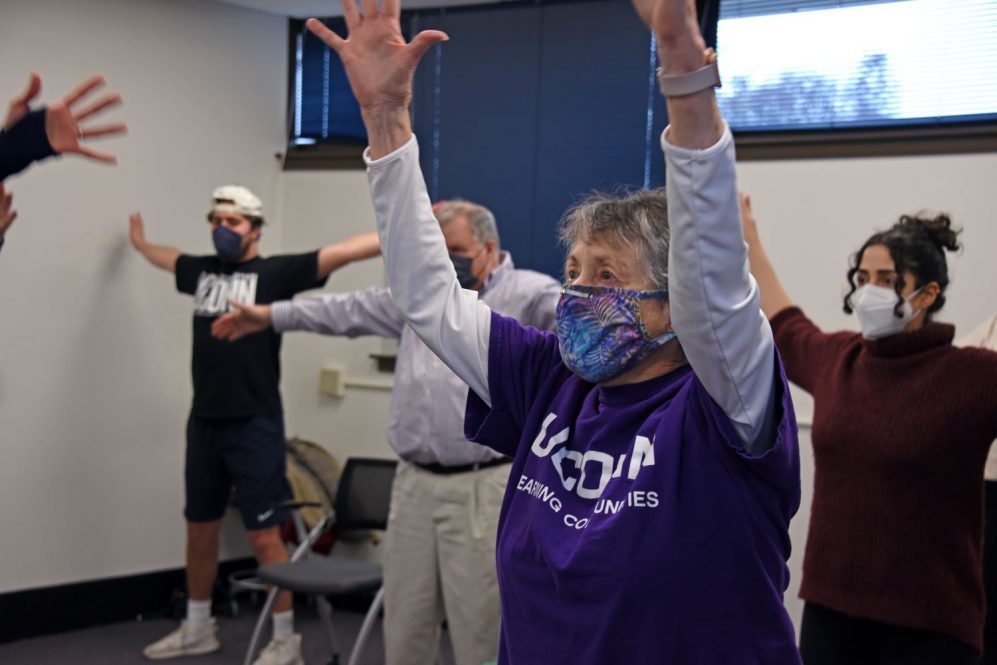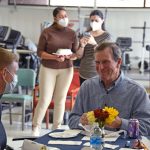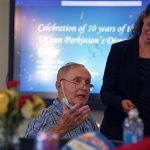There were warm embraces, touching stories, tears of joy, and lots of laughs at a celebratory lunch to mark 10 years of an exercise group to aid people with Parkinson’s disease.
Since 2012, the exercise group for people with Parkinson’s disease has met weekly for a movement-based therapy class developed by Cristina Colón-Semenza, assistant professor of kinesiology in the College of Agriculture, Health and Natural Resources.
“I believe in holistic care and this disease can bring feelings of depression and isolation,” says Colón-Semenza. “Coming together and making these social connections is good for the body and mind along with our main focus: physical rehabilitation.”
The class was originally offered through the Nayden Rehabilitation Clinic at UConn Health. The Nayden Rehabilitation Clinic offers outpatient physical therapy services to the UConn community and local residents. Using evidence-based research to deliver high-quality patient care, the clinic also serves as an educational facility and outreach setting for the Department of Kinesiology’s Doctor of Physical Therapy (DPT) Program.
The Parkinson’s disease exercise class provides an opportunity for students and faculty to work directly with patients to support and improve their health and well-being.
Exercise is important for everyone and those with Parkinson’s can benefit in slowing the progression of the disease and its effects on the brain and body. Parkinson’s, a neurodegenerative disease, affects nerve cells in the brain, which causes unintended and uncontrolled movements.
The class uses aerobic, balance, and coordination exercises, and offers a supportive space that can improve its members’ physical and mental health and motivation to exercise.
Colón-Semenza created the exercise class during her time working as a physical therapist at the Nayden Rehabilitation Clinic at UConn Health. Upon discharging a patient from their rehabilitation, she suggested they continue therapy at an exercise class for Parkinson’s patients in Glastonbury.
“There were many people in the area who had Parkinson’s disease. As I saw patients with Parkinson’s at the clinic, I’d recommend the class to them. In the time since, we’ve become more known and grown to offer the class well beyond the clinic’s patients.”
Colón-Semenza and Colleen Bonadies, physical therapist at UConn Health, have co-led the class as it transitioned from the Nayden Clinic to the Department of Kinesiology on the Storrs campus.
The class is now offered as a free service for the community through the UConn PT C.A.R.E.S. Pro-Bono Clinic, a student-run, faculty-guided program that offers health and wellness services to uninsured or underinsured members of the community to access physical therapy services.
The class creates a learning environment for students in the physical therapy program. Every semester, two students in the doctor of physical therapy program participate to gain experience working with patients with Parkinson’s disease.
Colón-Semenza has embarked on additional research exploring ways to treat patients with Parkinson’s disease, assessing their conditions and ensuring they experience the highest-possible quality of life.
Her current research examines which physical activities and interventions might work best for underrepresented populations, such as Hispanic communities. These groups have historically been marginalized in research studies on Parkinson’s disease and frequently experience barriers to access healthcare.
She is exploring peer support for exercise through a virtual program that aims to reach geographically diverse areas with support from the UConn Center on Aging.
In another project, Colón-Semenza is working with Clare Benson, an assistant professor of photography in the UConn School of Fine Arts, on an interactive project to create images through movement to improve walking ability and the motivation for practice. The project is funded by a STEAM Innovation Grant from the Office of the Vice President for Research.
“This is all research that has been spawned by this class and these participants,” says Colón-Semenza. “For the last ten years, our program has grown from clinical services to incorporate research, community outreach, and student learning. We wanted to recognize and celebrate this group for the inspiration we give one another.”
This work relates to CAHNR’s Strategic Vision area focused on Enhancing Health and Well-Being Locally, Nationally, and Globally.
Follow UConn CAHNR on social media






